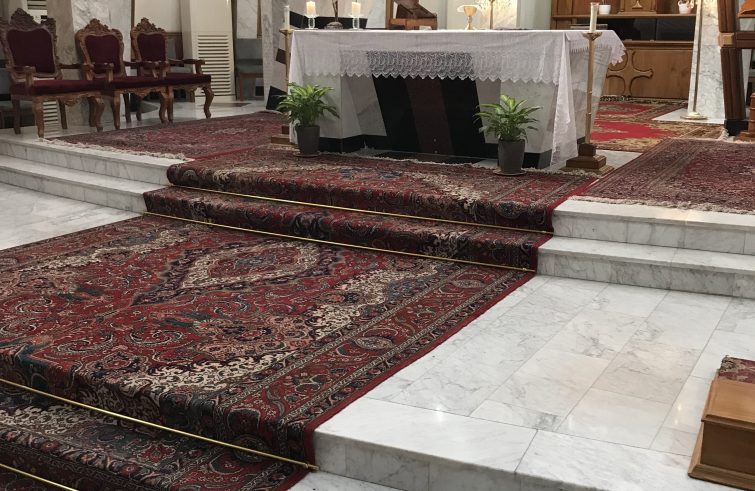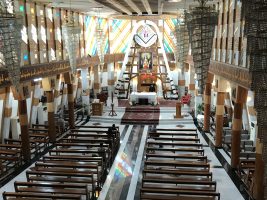
“Good Christians, good citizens, innocents”: said Fr Luis Escalante, parish priest of Sant’Antonino in Fara Sabina, Italy, in a statement to SIR regarding the 48 Iraqi martyrs massacred by five terrorists of the so-called “Islamic State of Iraq”, an Al Qaeda-affiliated group that attacked the Syrian Catholic Our Lady of Salvation Cathedral in Baghdad’s Karrada district on Sunday, 31 October 2010 during Mass service. Two young Iraqi priests, Father Thaer Abdal and Father Wassim Kas Boutros, were among the victims along with 46 “brethren, young families, parents of all ages, and even children, killed in the attack: three-year-old Adam, a three-month infant and a pregnant woman with child.” The previous week, during the “Special Synod for the Middle East” in the Vatican – October 10-24 2010 – Middle Eastern bishops had discussed the situation of Christians in the region, victims of persecution and attacks.
Church of martyrs. “All 48 perished inside the church, while none of the wounded died. This is a theological fact,” points out Fr Escalante, who cooperated in the diocesan phase of the Cause of Beatification and Declaration of Martyrdom of these “servants of God” which closed in Baghdad on 31 October 2019. From 13 October 2020, the postulator is Msgr. Flaviano Rami Al Kabalan, procurator of the Patriarchate of Antioch of the Syrians to the Holy See and apostolic visitor of the Syrian faithful in Europe.The release of the programme of the papal visit by the Holy See Press Office rekindled memories of that tragic attack. As anticipated to SIR by the Chaldean Patriarch of Baghdad, Card. Louis Raphael Sako, “the first public meeting of Pope Francis will take place on March 5, immediately after his arrival and the welcoming remarks by Government Authorities, in the Syrian Catholic cathedral where the tragic attack took place. Here the Pontiff will meet the bishops, priests, men and women religious, seminarians and catechists. “It will be an occasion to commemorate these martyrs whose proclamation is hoped for – Father Escalante said expectantly – although we are well aware that the process is still long. The Iraqi Church is a Church of martyrs, as we remember Sister Cecilia Moshi Hanna, killed in Baghdad in 2002, Chaldean priest Ragheed Ganni and his three deacons shot to death by a group of terrorists in Mosul in 2007. Without forgetting Msgr. Faraj P. Raho, the bishop of Mosul who was kidnapped and killed in 2008.”
- Cattedrale Siro-Cattolica di “Nostra Signora della Salvezza” a Baghdad
- Sagrestia
- In memoria dei martiri
“Steadfast in confessing God’s name. “The cathedral devastated by terrorists with explosives has been completely restored” said the priest, who travelled to Iraq several times over the past years to pursue and instruct the cause of beatification, “but the altar and the floor remained the way they were at the time of the massacre. The two priests, Thaer Abdal and Wassim Kas Boutros, the brother of another martyr, Father Ragheed Ganni, and other faithful are buried in the crypt. All the other victims repose in cemeteries throughout the country.” For Fr Escalante, “the Pope’s presence in the cathedral will be a meaningful highlight of the trip, a testimony in remembrance of these martyrs who drank the cup of the Lord and now eat at the feast in His Kingdom. They lost their lives while being summoned, on the Day of the Lord, for Holy Mass. From earthly liturgy to eternity.”
“They remained steadfast in confessing God’s name until the end”
The continual significance of this remembrance is further enhanced by the fact that the martyrs belonged to the Syrian Catholic and Chaldean rites. The worshippers were all lay faithful, ordinary Christians, reflecting the society to which they belonged,” Fr Escalante said. It was an attack on the faith of ordinary people.” The priest recalls the case of three-year-old Adam: “While the terrorists’ rifles were causing a massacre, the child shouted ‘enough, enough, enough!’. His cry, directed at the terrorist group, was the cry of all the massacred faithful.”
“It was the cry of all Iraqi Christians who asked not to die but to be accepted as human beings with their inherent rights.”
Those years saw attacks on churches, attacks on the homes of Christians, the mass exodus of the faithful, and Adam’s voice, “a child prophet Daniel, was the cry of justice against divisions, calling for the recognition of citizenship. Persecution is also about denying people their rights in their native land.”
The long path of dialogue. The Iraqi Church has been engaged in issues related to tolerance, dialogue, human rights, justice, respect for minorities, and the rejection of religious extremism for years. These themes resonate strongly in the Encyclical ” Fratelli tutti” (All Brothers) and in the document on “Human Fraternity for World Peace and Living Together” signed in Abu Dhabi by the Holy Father and the Grand Imam of Al AZhar, Ahmad Al-Tayyeb.”
“In the 21st century, the Church of Babylon has been called to offer her children as precious pearls to the universal Church”
said Fr Escalante. “They were good citizens, devout, innocents killed in a carefully planned attack. People who had been persecuted out of hatred for their faith, expelled for no reason. We hope that the visit of Pope Francis will give impetus to the cause of beatification of the Iraqi martyrs as well as to the path of justice, dialogue and coexistence within the country. It is a long road. ISIS – concludes the postulator – did not appear out of nowhere, nor all of a sudden. Many of those who acclaimed the Islamic State during the occupation of the Nineveh Plain are still there, and in Mosul. This kind of mindset is hard to eradicate. Dialogue must be rooted in the recognition of human rights as stipulated in the UN Universal Declaration.”














